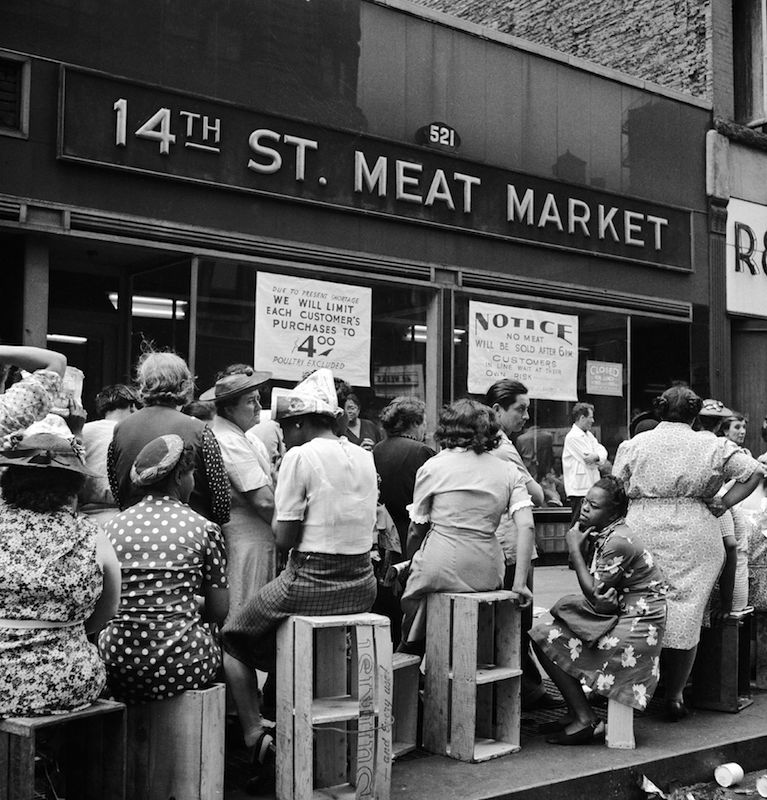
By all accounts, 1946 was a good year for the United States of America. The horrors of World War II had given way to a prosperous peace. Industrial production, business profits and farm income had reached all-time highs. The economy was booming, unemployment dropped to just three percent and, after years of wartime shortages, consumer appliances like radios and washing machines were again available to the public. “All this adds up to a splendid achievement,” declared President Truman in a speech in October of that year.
The American public, however, disagreed. While the economy soared, President Truman’s approval ratings plummeted.
Although spurred in part by the White House’s conflicts with organized labor and growing fears of Soviet communist influence, the brunt of the disapproval was aimed at something else: the state of American meat.
For centuries, beef and pork were the cornerstones of the American diet, considered essential “health” foods that even the Federal government proclaimed made men “strong and virile.” During the hardship of the Second World War, the majority of the nation’s red meat supply was shipped to the fighting men abroad and, starting in 1942, these items were heavily rationed on the home front. Government price ceilings on what meat remained drove many butchers to ruin, animal flesh grew increasingly scarce and, for years, many eaters throughout the country could not find a decent steak or pork chop for their dinner anywhere outside of the black market.
When the war ended in 1945, controls were lifted and the hungry citizenry rejoiced. But pent up demand for these favorite foods sent the price of beef skyrocketing by 70% within months, and cooks who were once thwarted by government restrictions now had to contend with the frustrating limitations of their pocketbooks. Seeing the beef crisis as the perfect opportunity to improve his opinion ratings, in the summer of 1946 Truman imposed price ceilings on meat. American cattlemen, still enjoying the fruits from their recent bonanza, retaliated against these profit-shrinking restrictions by withholding their animals from market. Another meat shortage ensued.
Get your history fix in one place: sign up for the weekly TIME History newsletter
At their wit’s end after years of rationing, and no longer inspired to patriotic modesty by the Hitlers and Tojos of the world, the American populace was outraged. Miners declared they could not work without more meat and began striking in Washington. Hospitals stirred scandal by claiming they could only find horsemeat to serve their sick patients. The lines outside the butcher shops still in operation stretched for blocks and provoked shoving and scratching amongst the patrons. TIME magazine dove right into the fray of this “widespread meat famine” and declared outright that Truman’s policies were a “dismal failure.”
To make matters worse for the President, the midterm Congressional election was just months away and Truman’s fellow Democrats, who then held the majority in both the House and the Senate, were bearing the brunt of the public’s meaty frustrations. In September of 1946, the Connecticut delegation in the House wrote Truman bemoaning, “The only thing people will talk about is meat. No matter what group we address, no matter what subject, invariably people will fire at us ‘why doesn’t’ Washington do something about meat.’” “The situation,” these Representatives concluded,” is growing desperate.” Viewing the state of public opinion heading to the polls, one Senator could not help but remark, “If Truman wanted to elect a Republican Congress he could not be doing a better job.”
The Republicans, of course, also recognized this great opportunity and swiftly stoked the public’s growing resentment. Their party slogan for that year was simply “Had Enough?”
“Got enough meat?.” one Representative needled voters in a stump speech, “Got enough OPA?.. Got enough inflation?”
Exasperated by the country’s beefy obsession, Truman gave into public pressure and lifted restrictions on meat prices mere weeks before the election. Republicans seized upon these actions as well, predicting publicly that this move by Truman was just a political ploy and that “more drastic” rationing policies would ensue following the November election. (Such predictions would not pan out.) Although the issue seemed resolved, the President was not pleased. He vented his true feelings about the meat crisis in passionate speech that he wrote, but never delivered: “You’ve deserted your president for a mess of pottage[,] a piece of beef – a side of bacon…. You’ve gone over to the powers of selfishness and greed. Therefore I am releasing the controls on meat and will proceed to release all other controls… Tell ‘em what will happen and quit.”
In spite of the President’s efforts, by November the American public had truly “Had Enough” of lack-luster dinners. Using their rights as free citizens, voters went to the polls in 1946 declaring “no meat – no vote” in what Representative Sam Rayburn had dubbed ”a damn beefsteak election.” When all votes were tallied, the American passion for beef had caused the Democratic Party to lose control of Congress for the first time in 16 years.
One nation. Under God. Indivisible. With plenty of roast beef and ham sandwiches for all.
Emelyn Rude is a food historian and the author of Tastes Like Chicken, available now.
More Must-Reads from TIME
- How Donald Trump Won
- The Best Inventions of 2024
- Why Sleep Is the Key to Living Longer
- Robert Zemeckis Just Wants to Move You
- How to Break 8 Toxic Communication Habits
- Nicola Coughlan Bet on Herself—And Won
- Why Vinegar Is So Good for You
- Meet TIME's Newest Class of Next Generation Leaders
Contact us at letters@time.com